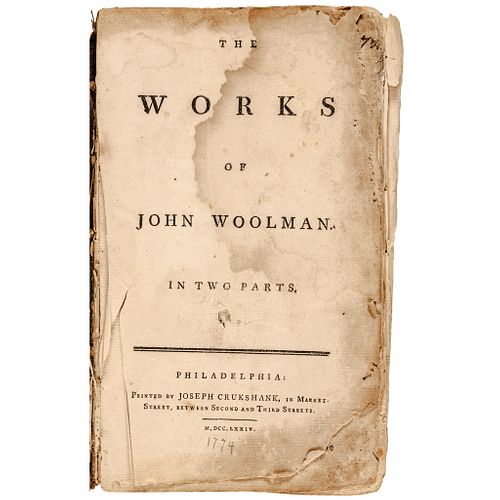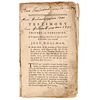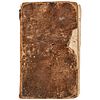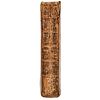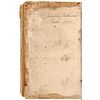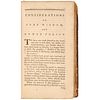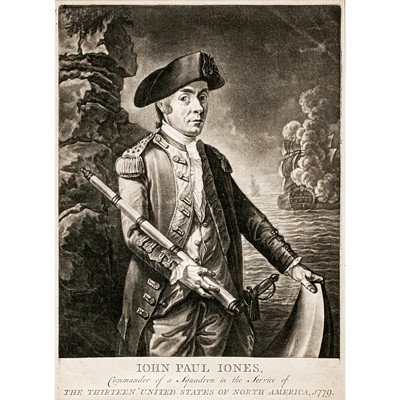1774-Dated Discussion of the Issue of Slavery in John Woolman Classic Book
Lot 216
Categories
Estimate:
$600 - $800
Absentee vs Live bid
Two ways to bid:
- Leave a max absentee bid and the platform will bid on your behalf up to your maximum bid during the live auction.
- Bid live during the auction and your bids will be submitted real-time to the auctioneer.
Bid Increments
| Price | Bid Increment |
|---|---|
| $0 | $10 |
| $200 | $20 |
| $300 | $25 |
| $500 | $50 |
| $1,000 | $100 |
| $2,000 | $200 |
| $3,000 | $250 |
| $5,000 | $500 |
| $10,000 | $1,000 |
| $20,000 | $2,000 |
| $30,000 | $2,500 |
| $50,000 | $5,000 |
| $100,000 | $10,000 |
| $200,000 | $20,000 |
| $300,000 | $25,000 |
| $500,000 | $50,000 |
About Auction
By Early American History Auctions
Jan 23, 2021
Set Reminder
2021-01-23 12:00:00
2021-01-23 12:00:00
America/New_York
Bidsquare
Bidsquare : Early American History Auction of Autographs, Americana, Political & Maps
https://www.bidsquare.com/auctions/early-american-history-auctions/early-american-history-auction-of-autographs-americana-political-maps-6311
311 Lots of Rare, Historic Autographs, Americana, Civil War Era, George Washington, Abraham Lincoln, Slavery & Black History, Revolutionary War Era, Colonial America, Federal Period, War of 1812, Colonial Currency, Indian Peace Medals & more... Early American History Auctions auctions@earlyamerican.com
311 Lots of Rare, Historic Autographs, Americana, Civil War Era, George Washington, Abraham Lincoln, Slavery & Black History, Revolutionary War Era, Colonial America, Federal Period, War of 1812, Colonial Currency, Indian Peace Medals & more... Early American History Auctions auctions@earlyamerican.com
- Lot Description
Black History
Classic 1774-Dated Book Discussion of the Issue of Slavery Printed in 1774 by Joseph Crukshank of Philadelphia, PA.
1774 Dated American Colonial Period, Hardbound Book titled, "A Journal of the Life, Gospel Labours, and Christian Experiences of that Faithful Minister of Jesus Christ, John Woolman, Late of Mounty-Holly, in the Province of New Jersey, North America, to which are added his Works...", by John Woolman, Very Good.
This book is bound in the original calf hard covers, measures 8.5" x 5" and consists of 436 pages, plus front matter consisting of two testimonials from friends. Printed in 1774 by Joseph Crukshank of Philadelphia. The covers are present, yet in poor condition and the front matter and pages 1 to 16 have come loose from the binding. The period paper pages have moderate overall even toning. There is no waterstaining, and the text is completely legible.
The importance of Woolman's work is not so much for his evangelistic endeavors, but for his early considerations of Slavery and the mistreatment of Africans and Indians. In fact, he devotes an entire chapter (54 pages) to the "Negro" question. Like most saints, part of Woolman's early life tended toward what he called "vanity and wantonness". However, once he "saw the light", he saw it well and when he was called on to write a bill of sale for a slave, he confessed to a certain uneasiness over the situation. Later, when given an opportunity to write another, he refused. His uncommon, early insights into the issue of slavery offer a refreshing glimpse into a view that is still relevant today. Seldom do the historical and moral values of pre-1800 imprints mesh together as they do here. Various chapters include "The Life and Travels of John Woolman", "On Labour", and "On Loving our Neighbors". In 1999, EAHA sold a later 1776 printing of this book for $517.50. This earlier edition is worth more, especially two decades later.
John Woolman (October 19, 1720 (O.S.)/October 30, 1720 (N.S.) - October 7, 1772) was a North American merchant, tailor, journalist, and itinerant Quaker preacher, and an early abolitionist in the colonial era. Based in Mount Holly, New Jersey, near Philadelphia, Pennsylvania, he traveled through frontier areas of British North America to preach Quaker beliefs, and advocate against slavery and the slave trade, cruelty to animals, economic injustices and oppression, and conscription.
Beginning in 1755 with the outbreak of the French and Indian War, he urged tax resistance to deny support to the military. In 1772, Woolman traveled to England, where he urged Quakers to support abolition of slavery.
Woolman published numerous essays, especially against slavery. He kept a journal throughout his life; it was published posthumously, entitled The Journal of John Woolman (1774). Included in Volume I of the Harvard Classics since 1909, it is considered a prominent American spiritual work. It has also been admired for the power and clarity of its prose by non-Quakers such as the philosopher John Stuart Mill, the poet William Ellery Channing, and the essayist Charles Lamb, who urged a friend to "get the writings of John Woolman by heart." The Journal has been continuously in print since 1774, published in numerous editions; the most recent scholarly edition was published in 1989.
- Shipping Info
-
Early American provides in-house worldwide shipping. Please contact us directly if you have questions about your specific shipping requirements.
-
- Buyer's Premium



 EUR
EUR CAD
CAD AUD
AUD GBP
GBP MXN
MXN HKD
HKD CNY
CNY MYR
MYR SEK
SEK SGD
SGD CHF
CHF THB
THB